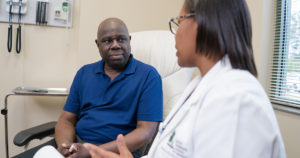 Columbus-based health care expert weighs in
Columbus-based health care expert weighs in- Racism, inferior treatment, lack of access to care plaguing Black cancer patients
Onumba.com (Culled from Fawol Media Group Archive 2009) — A gallimaufry of factors such as family history, unhealthy lifestyle, late diagnosis, and poor diet easily converge to help account for the high rate of cancer disease wreaking havoc in the Black community.
But according to a recent Yale University School of Medicine study, the foremost reason for the high rate of cancer among Blacks is none of the above. The culprit, the study unveiled, is poor treatment and unequal access to appropriate and recommended care for Blacks.
Simply put, Blacks do not receive the care they need and deserve.
Columbus-based health care professional and software developer Dr. Miebi Akah agreed.
“This is precisely where the issue of health care disparity comes into play,” said Dr. Akah, who is the founder, software programmer and chief executive officer at EKEBA International, LLC, a developer of health and educational software focusing on addressing the disease of cancer and other chronic illnesses. Dr. Akah decried the menace of racism in patient care and called for the elimination of health disparity in the American health care system.
The Nigerian immigrant expressed the view that “Unequal access to quality health care will almost always lead to negative health outcomes.”
It does.
Dr. Akah’s observations echoed the conclusions of the Yale study which appeared recently in the journal ‘Cancer’ of the American Cancer Society. More specifically, the study established that racial disparities involving cancer treatment in the U.S. health care system is why Black patients older than 65 are “consistently less likely” to receive recommended treatment for their condition than White patients in the same age cohort.
Yale researchers reached that conclusion after an analysis of the treatment received by more than 143,000 of its Medicare patients suffering from lung, breast, colon, rectal or prostate cancer from 1992 to 2002, and then comparing the quality and continuity of care received using race as a unit of analysis.
The widest level of disparity was found among patients suffering from lung, colon and rectal cancer, but the quality of care for all patients who participated in the study reflected a alarming racial divide.
Black patients with lung cancer were 19 percent less likely to undergo surgical operation to have the tumor removed than White patients. Similarly, for rectal and colon cancer, Blacks were 27 and 24 percent less likely to receive additional chemotherapy after surgery than their White counterparts, respectively.
Even when Black women with breast cancer were lucky enough to undergo their recommended lumpectomy, the study still found disparity there, noting that they were 7 percent less likely to receive the crucial follow up radiation therapy they need than White women.
There was also a disparity for Black men suffering from prostate cancer. There, 11 percent of Blacks were less likely to receive additional radiation treatment after undergoing surgery compared to their White counterparts.
All of which begs the question: Will racial disparity in health care ever be eliminated?
It doesn’t appear so, and here’s why.
Despite several years of government and private efforts aimed at addressing existing disparity in cancer treatment, the problem still persists in a healthy fashion, and as these findings reveal, there is a pittance in terms of progress to show for these efforts and initiatives, both at the state and federal level, spanning the period from 1992 when the study was initiated to 2002 after it was completed.
Lead researcher Cary Gross shed more light on these findings.
“What we found was that the racial disparities did not change during that 10-year time interval,” said Gross. Several factors, he noted, are behind the racial inequality in cancer treatment, including poverty, low income, and lack of access to care for Blacks, all of which is exacerbated by elevated rates of chronic conditions that are often left to linger into lethal crises in impoverished Black communities.
Along with everything stoking all of this is also the lingering and deep-seated distrust for the medical community among Blacks, which some might argue, even in subtle ways, impedes the delivery of adequate care to achieve optimum result.
But while the above factors may reflect most of the reasons for this problem, the chief medical officer for the American Cancer Society Otis Brawly noted the common thread weaving all of this together is “racism.”
“This sort of thing has been a problem in the United States for a long, long time,” he stated, perhaps going way back to several decades ago when W.E.B Dubois raised the alarm about the high rates of diseases and mortality within the Black community in one of his famous writings entitled, “The Health and Physique of the Negro.”
Although Brawly believes that substandard care reserved for Blacks is often tied to racism, he doesn’t really fault “individual” racism for that. Rather, he believes “institutional” racism is the culprit.
“I think individual racism likely accounts for a small amount of it, but not a large amount. What I would refer to as institutional or societal racism accounts for a much larger component of it.”
The executive director of the Ohio State University Kirwan Institute for the Study of Race and Ethnicity John Powell feels the same way.
“Our institutions are not changing to reflect our stated values.”
In all of those institutions, for all ages, tragically, deaths from cancer are 40 percent higher among Blacks than Whites.
Last week, CBS evening news reported a dollop of a drop in chronic diseases, including heart disease and stroke. Good, that eased the pain a bit, but it is not exactly clear how much of this slim decline is actually occurring in the Black community, moreover the small toboggan did not include cancer, which is the primary focus of the Yale study.
Either way, it is hugely evident from what was being reported that due to ubiquitous and stubborn racial disparities existing in the American health care system, the risk for all chronic conditions is still “three to four times greater for Blacks than Whites.”
Yet, whenever Blacks arrive at the hospital for medical care, they believe, as they should, that they are being offered the same quality of care as everyone else. Sadly, that is not the case.






